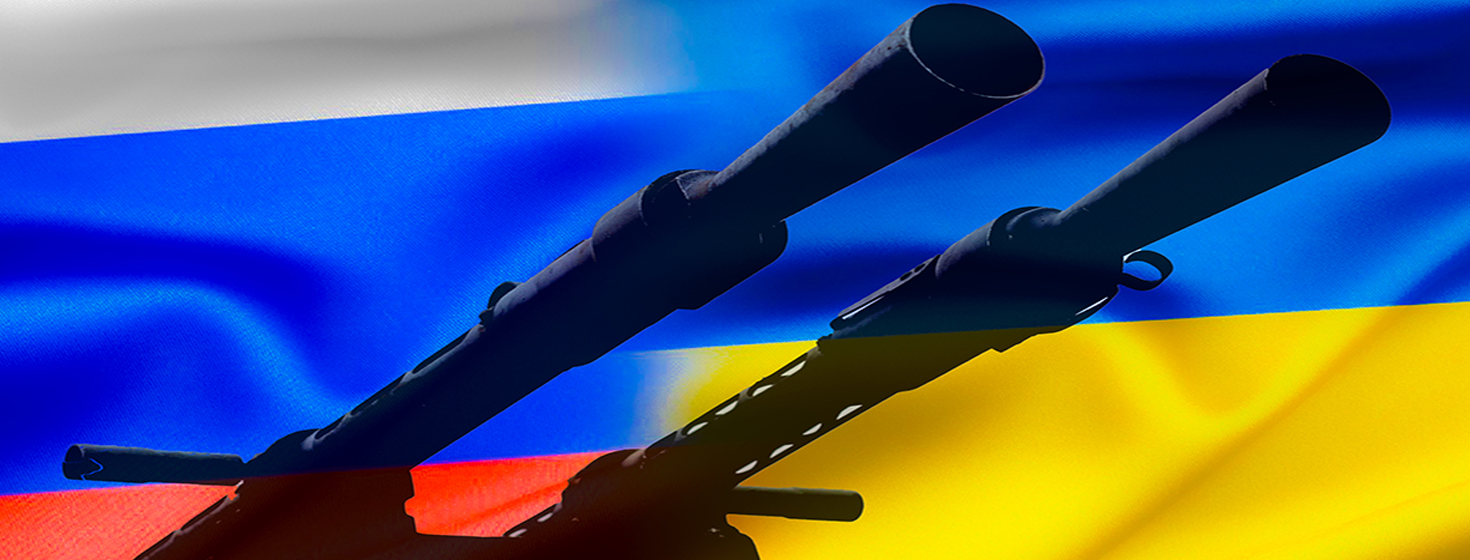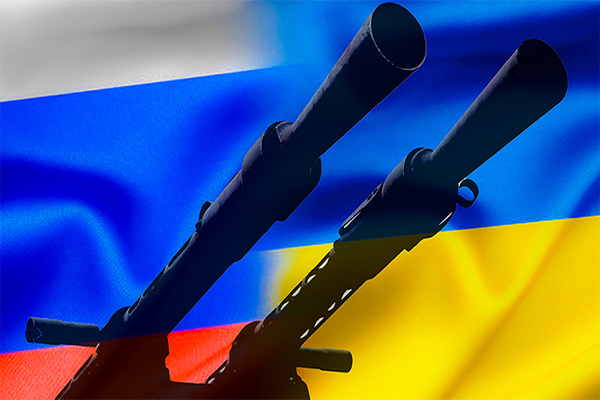Industry Stakeholders Highlight Logistics and Supply Chain Impacts of Russia-Ukraine Conflict

Given the fluidity, uncertainty, and unrest Russia’s invasion of the Ukraine situation has created, the subsequent logistics and supply chain-related impacts continue to evolve.
Russia’s Invasion of Ukraine
While Russia’s invasion of Ukraine goes on, the subsequent logistics and supply chain-related impacts continue to evolve in lockstep.
Over the past several days since Russia moved forward into Ukraine, there have been myriad impacts on logistics and supply chain operations, in the form: of rapidly increasing oil and gas prices, shippers and carriers implementing contingency plans; a ceasing of port operations in Ukraine, which the Wall Street Journal said could disrupt vital shipping routes that carry much of the world's wheat and other agricultural products; and several global logistics and freight transportation services providers halting service into and out of both Russia and Ukraine.
Given the fluidity, uncertainty, and unrest this situation has created, things are anything but predictable, at this point in time, save for a healthy dose of speculation and forecasting, as to how things may play out in the short-term and also how long this conflict could last and continue to foster the unknown in a sense.
Simon Geale, executive vice president for procurement, for Proxima, a supply chain consultancy, observed that supply chains are volatile and logistics providers were unprepared for the impact of the conflict in Ukraine as it far outweighs other predicted risk factors in 2022.
“The pandemic, extreme weather, and price instability were all on the agenda but now all eyes are on Ukraine as the Russian invasion wreaks havoc on already strained supply chains,” observed Geale. “It is now imperative that the world plans for both the short-and long-term consequences as the situation develops.
In the short-term, Geale explained that the exodus from Russian investments and SWIFT legislation is severely complicating payments. And he added that prices across the board are soaring, from energy to transport and manufactured goods.
“For instance, Russia and Ukraine produce 29% of global wheat supplies, and Russia alone accounts for 40% of palladium, which is used for car and electronics production. Several car factories have shut down in Germany as semiconductor shortages are exacerbated further,” said Geale. This is likely just the beginning of the disruption. The world’s reliance on Russia for certain commodities such as wheat and sunflower oil is being exposed and goods that are transported through the Black Sea will face significant difficulties. Shipping from Ukrainian ports has practically ceased and as airlines warn of Russian airspace closures, transportation costs will soar making some routes unusable.”
What’s more, Geale noted that businesses must now consider how the sanctions placed on Russia might have a long-term impact.
“With sales and trading with Russia increasingly ceasing, procurement leaders must create lasting solutions should the sanctions become permanent and ultimately isolate the Russian market from global business,” he said.
“Increased production from other countries will mitigate the impact of the crisis, though it will be a few months before the effects of this are felt. Fuel production in countries such as Saudi Arabia can increase whilst nuclear is also a mid-term power option. Other commodities can be sourced from South Africa (Palladium) or notably the US and Canada (wheat/ gas). However, many markets are operating at capacity and such shifts will take time and push up costs.”
Logistically, Geale stressed there is a need to consider how businesses can create routes that avoid the area, stating that supply chains can no longer ignore geopolitical risks in Europe as the conflict must become a fundamental pillar of procurement strategies.
Data provided to Logistics Management by Chicago-based FourKites, a provider of real-time tracking and visibility solutions across transportation modes and digital platforms, showed significant declines in Russian-bound imports, for the week of February 28, when the invasion of Ukraine began said Glenn Koepke, GM, Network Collaboration at FourKites.
FourKites’ data pointed to Russian import volumes seeing a 28% decline, from the week of February 21 to the week of February 28, with oil and gas down 12%. And it also noted that manufacturing and retail sectors were the most affected, down 56% and 28%, respectively, for the same period.
FourKites also made the following observations:
- FourKites continues to see an increase in delayed shipments in the region. Among LTL loads traveling into Eastern Europe, delayed loads have increased by 20% since before the invasion began;
- As of March 2, export dwell times for all European ports have increased by 25% since February 17; Transshipment dwell times for European ports have increased by 43% over the same period;
- FourKites has seen the largest increases in ocean dwell time in Consumer Packaged Goods (CPG) and Food & Beverage (F&B), where dwell times in Europe have increased by 55% for FourKites customers between February 17 and March 2;
- Dwell times have been impacted across Europe, with dwell times up 41% in Western Europe, 6% in Eastern Europe, 26% in Southern Europe, and 17% in Northern Europe between February 17 and March 2; and
- Ocean freight rates are skyrocketing past their already record highs. FourKites anticipates as much as a 20 to 40-fold increase in ocean freight rates. This is already happening – where shipments from Shanghai to Rotterdam were less than $2,000 two years ago, some freight forwarders showed rates at $54,000 for a single container immediately after the invasion. Airfreight prices are likewise increasing.
“As it pertains to Imports into Russia, the volume of shipments into Russia has plummeted – already down 17% week-over-week as of March 2nd compared to February 17,” it said.
“This is due to several factors, from sanctions to treacherous routes. Many shippers have pulled out after facing dangerous conditions at the ports including incidences of friendly fire. And as popular opinion against the violent incursion crystalizes, Individual retailers and major brands are also choosing to no longer do business with Russia.”
A research note written by Eric Oak, research director for global trade intelligence firm Panjiva pointed out that the fallout from the conflict is likely to spread into global supply chains and impact economies in Eastern Europe and beyond.
“The first-order effects may come from the mounting economic sanctions imposed by the U.S. and other countries on Russia, and widespread disruptions in Ukraine,” wrote Oak.
“From a U.S. economic perspective, imports from Ukraine rose 28.7% year over year in the fourth quarter of 2021. Disruptions are likely to be felt across all industries, but the majority of U.S. imports from the country are in the metals category: 59.7% in 2021. This increased 61.8% year over year in the fourth quarter; February data will likely indicate a fall in growth. Companies that import metals, mostly pig iron, from Ukraine include Nucor Corp., Eusider SpA, and Steel Dynamics Inc., the imports of which rose 68.1%, 66.0%, and 16.0% year over year in 2021, respectively. Those sources will likely be disrupted in some way if the conflict continues.”
Reactions to the conflict from Tim Fiore, Chair of the Institute for Supply Management’s (ISM) Manufacturing Business Survey Committee, and Tony Nieves, of ISM’s Management Services Business Survey Committee, were somewhat tempered, given the uneven and changing state of affairs, at the moment.
“I don’t know that the situation in Ukraine is going to impact us too much,” said Fiore. “It is too early to tell. I don’t think any nation has ever been cut off from the international banking system like Russia has and by extension Ukraine, too. They are not big trading partners with the U.S. Even with Europe, outside of energy and aluminum, and some corn and wheat and some specialty minerals like titanium. There is generally a lot of inventory in other parts of the world for that anyway. The biggest headwind here is driving oil over $100 per barrel…that could actually be good because it could drive reinvestment in the U.S. and could drive 13 million barrels of a day worth of oil refining again.
Nieves commented that any challenges stemming from the conflict for the services-based economy pale compared to the manufacturing sector, which he said is at the forefront of what is happening.
“The resources coming through Russia and Ukraine are barrels of oil, things needed for chip manufacturing like steel, natural gas, and other things,” he said. “Things like that will come through the supply chain and eventually hit us for things like fuel prices, which we are already seeing, as well as any petroleum-based products, as well as steel, chips, and it will also affect the production of cars. It really is more of a trickle-down to services after hitting manufacturing first.”
Russia’s War with Ukraine Could Permanently Reshape the Global Supply Chain
Companies will no longer be able to separate business from geopolitics, and the global supply chain will never be the same. By Tinglong Dai
Francis Fukuyama, the American political scientist who once described the collapse of the Soviet Union as the “end of history,” suggested that Russia’s invasion of Ukraine might be called “the end of the end of history.” He meant that Vladimir Putin’s aggression signals a rollback of the ideals of a free Europe that emerged after 1991. Some observers suggest it may kick off a new Cold War, with an Iron Curtain separating the West from Russia.
As an expert in global supply chains, I think the war portends the end of something else: global supply chains that Western companies built after the Berlin Wall fell more than three decades ago.
Supply chains - often vast networks of resources, money, information, and people that companies rely on to get goods or services to consumers - were already in disarray because of the COVID-19 pandemic, resulting in massive shortages, disruptions, and price inflation. The war and resulting sanctions against Russia have immediately put further strains on them, prompting skyrocketing energy prices and even fears of famine.
But beyond these short-term effects, I believe the invasion of Ukraine could drastically reshape global supply chains in a way the pandemic never did.
Immediate Effects: Fuel and Famine
Russia accounts for less than 2% of global gross domestic product, while Ukraine accounts for only 0.14%. As a result, they have a little direct impact on global supply chains - except in a few very important areas.
Let’s start with the most obvious one: energy. Russia provides nearly 40% of Europe’s natural gas supply and 65% of Germany’s. It is the third-largest oil exporter in the world, accounting for 7% of all crude oil and petroleum product imports into the United States. After the Biden administration signaled it would stop importing Russian oil, the price of crude topped $130 per barrel for the first time in 13 years, and consumers in some parts of the U.S. have seen average gasoline prices rise above $5 per gallon.
Less obviously, Russia and Ukraine account for nearly one-third of all global wheat exports. Several countries, including Kazakhstan and Tanzania, import more than 90% of their wheat from Russia. The war has the potential to disrupt the still-recovering global food supply chain and endanger the livelihoods of millions of people.
Even less obviously, Ukraine produces 90% of the semiconductor-grade neon used in the United States. Russia, on the other hand, provides the U.S. more than a third of its palladium, a rare metal also required to make semiconductors. Although companies have enough inventory to fulfill immediate needs and may find alternative suppliers, some disruptions are inevitable. And this comes at a time when the world is still suffering from a severe chip shortage, which has slowed auto production and sent new and used car prices soaring.
It is also worth noting that Russia is a dominant exporter of titanium and titanium forgings, which are popular in the aerospace industry because of their lightweight. This war will further stress the aerospace supply chain.
Snarling Trade
While the direct effects of the invasion on supply chains are relatively limited, the impact on the global movement of goods and services has been significant - I believe even greater than from COVID-19.
After 36 countries, including EU members, the U.S., and Canada, closed their airspace to Russian aircraft, Russia retaliated with the same restrictions. As a result, goods transported by air freight from China to Europe or the Eastern U.S. may need to be rerouted or use slower or more expensive modes of transportation. The China-Europe rail freight route that goes through Russia, which was experiencing a boom in 2021 because of congestion in major ports, now faces mounting cancellations from European clients.
Russia’s invasion of Ukraine has also had a devastating impact on global trade movements, with hundreds of tankers and bulk carriers stranded at ports as a result of sanctions imposed on Russian-connected ships. It has also resulted in severe travel and transport restrictions imposed on Russia and Belarus in an unprecedentedly rapid and broad manner that has been coordinated among multiple nations.
In addition, the disruption of the route from China to Europe and the U.S. could do severe damage to China’s “Belts and Roads” initiative. That’s the ambitious trillion-dollar project aimed at reshaping global trade and affirming the dominance of a China-centric global supply chain, especially in Europe and Asia. Because both Russia and Ukraine are critical links in the initiative, it will almost certainly need to scale back in size and scope.
A Supply Chain Iron Curtain
New York Times columnist Thomas Friedman, a true believer in globalization, in 1996 famously theorized that no two countries that both have a McDonald’s would ever fight a war against each other. McDonald’s has about 850 restaurants in Russia and 100 in Ukraine, all of which have now been temporarily closed.
His point was that countries with economies and middle classes big enough to support a McDonald’s “don’t like to fight wars; they like to wait in line for burgers.” It was also based on the belief that rational economic calculations will always triumph over geopolitical conflicts - that is, leaders in such countries wouldn’t let their differences get in the way of trade and making money.
And the supply chains that companies erected in the decades since then have crisscrossed the globe, ignoring old enemy lines for the sake of efficiency and higher profits.
Friedman now concedes Russia’s action has shattered that theory. I agree, and in fact, the world may now be on the cusp of a new type of supply chain Iron Curtain, with Russia and its allies on one side and the West on the other. Companies will no longer be able to separate business from geopolitics.
And those allies include China, which remains pivotal to most Western companies’ supply chains. Despite China’s ambiguous stance on the invasion, the war will likely serve as a catalyst to reduce that dependence, at least for critical products such as materials used for semiconductor manufacturing, medical supplies, and electric batteries.
Moreover, the growing emphasis of shareholders and regulators on environmental, social, and governance issues means how a company does in each category can affect its daily operations and cost of capital. On the issue of Ukraine, the push to be more socially responsible is one reason companies have over-complied with sanctions. It’s also prompting them to proactively avoid geopolitical risks, which can involve retreating from an entire economy.
Russia’s war against Ukraine is still ongoing, and there’s no way to know for certain how long the sanctions will remain in place or whether companies that have chosen to leave Russia will return. But I believe one thing is certain: Global supply chains, like the rest of the world, will never be the same again.
Tinglong Dai is a professor of operations management and business analytics at the Carey Business School at Johns Hopkins University.
This article is republished from The Conversation under a Creative Commons license. Read the original article.
Read the Article: Global Supply Chains Brace for Impact of Potential Russia-Ukraine Conflict
Article Topics
FourKites News & Resources
FourKites and BuyCo Team Up to Improve Ocean Freight Management Potential for 2024 East Coast Port Strike Kickstarts Supply Chain Contingency Planning FourKites’ Koepke Examines Current Logistics Trends and Themes Industry executives address the impact of Yellow’s exit on the LTL marketplace Q&A: FourKites’ Koepke examines major factors impacting global trade Q&A: Rocky Subramanian, President, FourKites FedEx and FourKites herald new supply chain visibility strategic partnership More FourKitesLatest in Supply Chain
TIm Cook Says Apple Plans to Increase Investments in Vietnam Amazon Logistics’ Growth Shakes Up Shipping Industry in 2023 Spotlight Startup: Cart.com is Reimagining Logistics Walmart and Swisslog Expand Partnership with New Texas Facility Nissan Channels Tesla With Its Latest Manufacturing Process Taking Stock of Today’s Robotics Market and What the Future Holds U.S. Manufacturing Gains Momentum After Another Strong Month More Supply ChainAbout the Author















